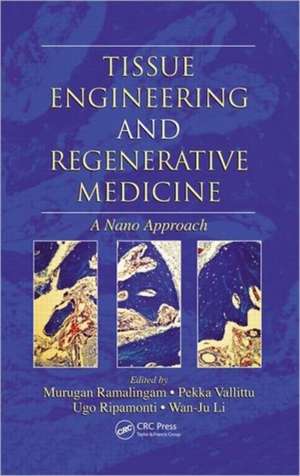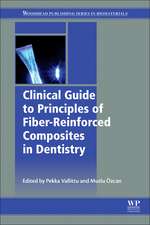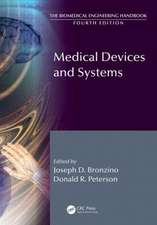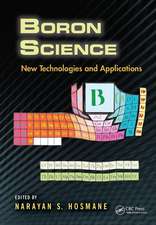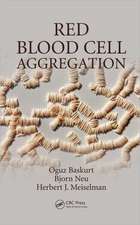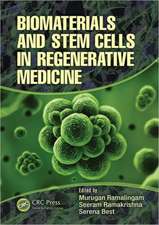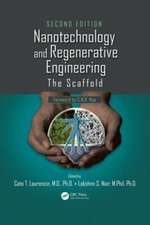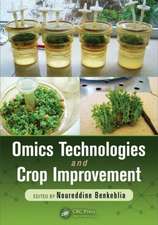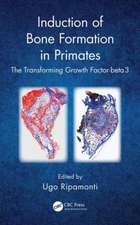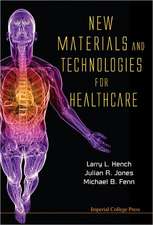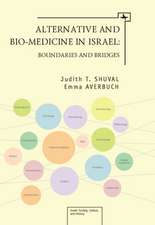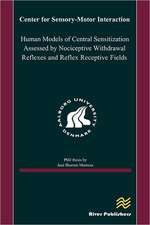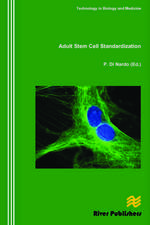Tissue Engineering and Regenerative Medicine: A Nano Approach
Editat de Murugan Ramalingam, Pekka Vallittu, Ugo Ripamonti, Wan-Ju Lien Limba Engleză Hardback – 18 sep 2012
Written by internationally renowned scientists, engineers, and clinicians, the chapters cover the following areas:
- Nanobiomaterials and scaffolds—including nanocomposites and electrospun nanofibers
- Tissue mechanics
- Stem cells and nanobiomaterials
- Oral and cranial implants and regeneration of bone
- Cartilage tissue engineering
- Controlled release—DNA, RNA, and protein delivery
- Animal science and clinical medicine
Preț: 1029.26 lei
Preț vechi: 1375.04 lei
-25% Nou
Puncte Express: 1544
Preț estimativ în valută:
196.98€ • 205.11$ • 166.47£
196.98€ • 205.11$ • 166.47£
Carte tipărită la comandă
Livrare economică 11-25 martie
Preluare comenzi: 021 569.72.76
Specificații
ISBN-13: 9781439881859
ISBN-10: 1439881855
Pagini: 592
Ilustrații: 242 color images and 21 tables
Dimensiuni: 156 x 234 mm
Greutate: 1.26 kg
Ediția:New.
Editura: CRC Press
Colecția CRC Press
Locul publicării:Boca Raton, United States
ISBN-10: 1439881855
Pagini: 592
Ilustrații: 242 color images and 21 tables
Dimensiuni: 156 x 234 mm
Greutate: 1.26 kg
Ediția:New.
Editura: CRC Press
Colecția CRC Press
Locul publicării:Boca Raton, United States
Public țintă
Students, researchers, professors, and industrial experts working in the fields of biomaterial science and engineering, nanoscience and nanotechnology, bioengineering, cell biology, biomedical sciences, tissue engineering, and nanomedicine.Cuprins
Biostable Composite Biomaterials in Medical Applications. Bioceramic and Biopolymer Nanocomposite Materials for Use in Orthopedic Applications. Tailoring of Bioactive Glasses. Bioactive Ceramic Coatings for Metallic Implants. Induction of Bone Formation by Calcium Phosphate-Based Biomimetic Macroporous Constructs. Bioinspired Titanium Implants: The Concavity—The Shape of Life. Bioactive Surface Modifications for Dental and Orthopedic Implants. Oral Implants: Biological Background and Current Concepts in Peri-Implantitis Treatment. Soft Tissue Attachment on Implant Surface. Surface Chemical Determination of the Placement, Growth, and Differentiation of Cells for Drug Screening, Toxin Detection, and Lab-on-a-Chip Applications. Electrospun Nanofibers as Next-Generation Bioactive Tissue Scaffolds. Mechanics of Fiber-Reinforced Scaffolds and Tissues Formed from Organized Electrospun Assemblies. Regulation of Stem Cell Behavior Using Nanobiomaterials. Biomaterials and Their Use in Craniofacial Surgery. Nanobiomaterials for Bone Tissue Engineering. Stem Cells, Growth Factors, and Biomaterials in Bone Surgery. Nanomaterials for Cartilage Regeneration. Cartilage Tissue Engineering: Advances in Stem Cell-Based Approaches. Stem Cells and Nanobiomaterials for Cardiac Tissue Regeneration. Nanotechnology for Engineering Cellular Microenvironment and Gene Delivery. Nanobiomaterial-Based Short Interfering RNA Delivery Systems. Sugar–Glass Nanoparticles for Protein Delivery. Clinical Relevance of Tissue Engineering. Future Perspectives of Biomaterials and Stem Cells in Regenerative Medicine. Index.
Notă biografică
Murugan Ramalingam is an associate professor and scientist ‘G’ at the Centre for Stem Cell Research (CSCR), Department of Biotechnology, Government of India, Christian Medical College Bagayam Campus, Vellore, Tamil Nadu, India. He is also an adjunct associate professor at the Tohoku University, Sendai, Miyagi, Japan. Dr. Ramalingam’s current research interests focus on the development of multiphase biomaterials, through conventional to nanotechnology to biomimetic approaches, cell patterning, stem cell differentiation, and tissue engineering. He is the author of more than 125 publications, including peer-reviewed journal papers, conference proceedings, book chapters, authored books, edited books, and patents relevant to biomaterials and tissue engineering. He serves on the editorial boards of multiple biomaterials- and tissue engineering-related journals.
Pekka Vallittu is a full professor of biomaterials science in the Faculty of Medicine, University of Turku, Finland, and works as the dean of the Institute of Dentistry and the director of the Turku Clinical Biomaterials Centre. He is also an honorary professor at the University of Hong Kong, Pokfulam. Professor Vallittu’s research activity on fiber-reinforced composites started from his hobby of model aircraft and has lasted for more than 25 years. His first applications for fiber-reinforced composites were in dentistry, followed by active research to utilize fiber-reinforced composites as biomimetic materials, also in medicine. Professor Vallittu has more than 300 original research papers, 500 other papers and abstracts, and 140 granted international patents based on 17 innovations. He has been awarded a Distinguished Scientist Award in Prosthodontics and Implant Research by the International Association of Dental Research.
Ugo Ripamonti is a professor and the director of the Bone Research Laboratory, a research unit of the South African Medical Research Council and the University of the Witwatersrand, Johannesburg, South Africa, within the Faculty of Health Sciences at the medical school. Dr. Ripamonti is a national and an international scholar focusing on experimentation on tissue engineering of bone, tissue induction, and morphogenesis by transforming growth factor-βs and osteoinductive biomimetic matrices in preclinical and clinical contexts. He has received numerous awards, including the Marshall R. Urist Awarded Lecture at the Sixth International Conference on Bone Morphogenetic Proteins in 2006 in Dubrovnik. He has published more than 200 scientific papers, including patents and book chapters for specialists.
Wan-Ju Li is the principal investigator of the Musculoskeletal Biology and Regenerative Medicine Laboratory at the University of Wisconsin-Madison. He is also an affiliated faculty member in the Cellular and Molecular Biology Program, Stem Cell and Regenerative Medicine Center. Professor Li’s research interests include stem cell, tissue engineering, nanobiomaterial, and skeletal biology. He has received the Fellow Award for Research Excellence from the National Institutes of Health and the Young Investigator Research Award from the North American Spine Society. Professor Li has published 30 papers, nine book chapters, and more than 60 abstracts. He holds three patents in cartilage, intervertebral disc, and tendon/ligament applications. He also serves in the editorial board of the American Journal of Stem Cells, the Journal of Regenerative Medicine and Tissue Engineering, the Formosan Journal of Musculoskeletal Disorders, and the Journal of Biosensors and Bioelectronics.
Pekka Vallittu is a full professor of biomaterials science in the Faculty of Medicine, University of Turku, Finland, and works as the dean of the Institute of Dentistry and the director of the Turku Clinical Biomaterials Centre. He is also an honorary professor at the University of Hong Kong, Pokfulam. Professor Vallittu’s research activity on fiber-reinforced composites started from his hobby of model aircraft and has lasted for more than 25 years. His first applications for fiber-reinforced composites were in dentistry, followed by active research to utilize fiber-reinforced composites as biomimetic materials, also in medicine. Professor Vallittu has more than 300 original research papers, 500 other papers and abstracts, and 140 granted international patents based on 17 innovations. He has been awarded a Distinguished Scientist Award in Prosthodontics and Implant Research by the International Association of Dental Research.
Ugo Ripamonti is a professor and the director of the Bone Research Laboratory, a research unit of the South African Medical Research Council and the University of the Witwatersrand, Johannesburg, South Africa, within the Faculty of Health Sciences at the medical school. Dr. Ripamonti is a national and an international scholar focusing on experimentation on tissue engineering of bone, tissue induction, and morphogenesis by transforming growth factor-βs and osteoinductive biomimetic matrices in preclinical and clinical contexts. He has received numerous awards, including the Marshall R. Urist Awarded Lecture at the Sixth International Conference on Bone Morphogenetic Proteins in 2006 in Dubrovnik. He has published more than 200 scientific papers, including patents and book chapters for specialists.
Wan-Ju Li is the principal investigator of the Musculoskeletal Biology and Regenerative Medicine Laboratory at the University of Wisconsin-Madison. He is also an affiliated faculty member in the Cellular and Molecular Biology Program, Stem Cell and Regenerative Medicine Center. Professor Li’s research interests include stem cell, tissue engineering, nanobiomaterial, and skeletal biology. He has received the Fellow Award for Research Excellence from the National Institutes of Health and the Young Investigator Research Award from the North American Spine Society. Professor Li has published 30 papers, nine book chapters, and more than 60 abstracts. He holds three patents in cartilage, intervertebral disc, and tendon/ligament applications. He also serves in the editorial board of the American Journal of Stem Cells, the Journal of Regenerative Medicine and Tissue Engineering, the Formosan Journal of Musculoskeletal Disorders, and the Journal of Biosensors and Bioelectronics.
Recenzii
"This book broadly covers current topics of tissue engineering. In particular, it would be helpful for those who are studying in this field based on nanotechnology and biomaterial science."
—Shoji Takeuchi, The University of Tokyo
—Shoji Takeuchi, The University of Tokyo
Descriere
This book bridges the gap between nanotechnology and regenerative medicine to facilitate the transition from lab to the clinic. It compiles important aspects of basic science and fundamental principles for current nanotechnological innovations in biomaterials and cell, tissue, and organ engineering, and their clinical relevance, as well as future trends in regenerative medicine. The book is intended for a wide audience including students, researchers, professors, and industrial experts working in the fields of biomaterial science and engineering, nanoscience and nanotechnology, bioengineering, cell biology, biomedical sciences, tissue engineering, and nanomedicine.
